Schizophrenia is a mental disorder that causes people to have trouble distinguishing between what is real and what is not. This can lead to hallucinations, delusions, or disorganized speech. Talk to your doctor if you are concerned about schizophrenia symptoms.
Contents
What Is Schizophrenia?
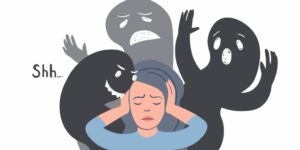
Schizophrenia is a mental disorder characterized by abnormal social behavior and failure to recognize what is real. Common symptoms include auditory hallucinations, delusions, and disorganized speech. Schizophrenia symptoms can vary from person to person depending on their age, location, environment, past experiences, and what stage the disorder is at. The disorder often develops over a number of years.
Schizophrenia can make it hard for a person to distinguish between what’s real and what’s not. That means that people with schizophrenia may experience hallucinations, delusions, or disorganized speech. If you’re worried that you or someone you know might have schizophrenia symptoms, then talk to your doctor.
Symptoms generally come on gradually but sometimes develop quickly within a few weeks. Schizophrenia may be triggered by a very stressful event such as bereavement which can bring on schizophrenia symptoms quickly. A schizophrenic episode may last anywhere from 30 minutes to 12 months. Some people with schizophrenia do not experience periods of wellness and can suffer from it for years without treatment.
Early Warning Signs Of Schizophrenia
Schizophrenia symptoms can be wide-ranging and may affect everyone differently. It is important to remember that not all people with schizophrenia will display the same symptoms.
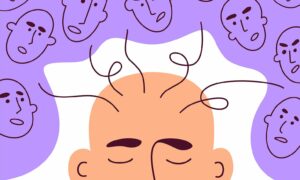
- Persistent depression
- Loss of interest in activities once previously enjoyed
- Lethargy
- Problems with attention
- Decision-making
- Memory
- Social withdrawal
- Decrease in energy levels
It is important to seek help if you or someone you know is experiencing any of the symptoms of schizophrenia. While there is no cure for the disorder, there are treatments available that can help control the symptoms. Treatment options include medication and therapy. However, it is crucial to seek help as soon as possible early intervention often leads to better outcomes.
The earlier people get diagnosed and treated for schizophrenia, the better off they can be in managing their symptoms. Many people experience their first schizophrenia symptoms when they’re in the teen years or early adulthood, but schizophrenia in children is possible. This older video explains how to help your child cope if he or she has schizophrenia symptoms.
Schizophrenia Symptoms
There are three main types of schizophrenia symptoms: positive, negative, and cognitive. Positive symptoms are those that add to the person’s normal behavior, such as hallucinations or delusions. Negative symptoms are those that take away from the person’s normal behavior, such as not being interested in anything or not being able to feel joy. Cognitive symptoms are problems with thinking, such as having trouble organizing thoughts or being confused.
Symptoms of schizophrenia fall into 3 broad categories: positive, negative, and cognitive. A person with the disorder may display any combination of these types of symptoms. The most common symptoms include:
Positive Symptoms (psychotic behaviors not seen in healthy people)
The positive symptoms of schizophrenia include hallucinations and delusions. These symptoms fall into three categories: auditory hallucinations, visual hallucinations, and tactile or physical hallucinations.
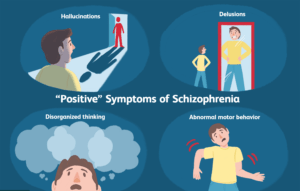
Hallucinations: hearing, seeing, and smelling things that are not real.
Auditory hallucinations– hearing voices talking about them or to them. The voices may talk about the person in the third person or directly address their actions
Visual hallucinations– seeing things that are not there, maybe people, objects, bugs, worms crawling on the skin, etc.
Tactile/physical hallucinations– the sensation of bugs crawling under one’s skin. A person experiencing a tactile hallucination may feel something crawling on their skin there is nothing actually there.
Delusions: beliefs in false things, such as other beings, forces, or events that do not exist; bizarre delusions (for example an individual may believe they have special powers) False beliefs that others find strange (delusions). A sense that thoughts are being inserted or withdrawn from one’s mind (thought withdrawal)
Strange bodily sensations (hallucinations), such as feeling as though one is in a dream-like state; having unusual sensory experiences; experiencing unpleasant smells, tastes, sights; compulsions to repeat certain acts
Hallucinations Thought disorder: when a person has trouble organizing their thoughts or connecting with what is really happening around them
Catatonia (similar to mania in bipolar disorders): showing unusual motor behavior such as strange postures; sometimes includes repetitive speech and movements. This can also manifest itself in immobility and resistance to instructions to move
Disorganized speech is when a person’s spoken words do not make sense. An example of disorganized behavior would be putting clothes on backward and then wondering why they don’t work right. A lack of emotion or inappropriate emotional response.
Negative Symptoms (symptoms that reduce or eliminate normal emotional responses)
Negative symptoms are those that take away from the person’s normal behavior, such as not being interested in anything or not being able to feel joy. These symptoms include decreased motivation, blunted affect (emotional response), and social withdrawal.
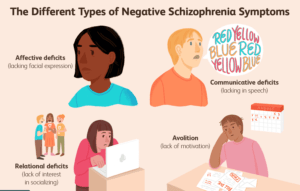
Decreased Motivation: a person with schizophrenia may lose interest in things they used to enjoy and have difficulty starting and completing tasks
Blunted Affect: a person with schizophrenia may not show the usual range of emotions, appearing flat or emotionless. They may not laugh or cry as other people do in response to different situations
Social Withdrawal: a person with schizophrenia may pull away from friends and family, stop participating in activities they used to enjoy, and become isolated.
- Lack of pleasure in everyday life Inability to experience the full range of emotions (such as flat affect)
- limited facial expressions and body language
- anxiety
- lowered energy level
- Deficits in normal emotional responsiveness
- abolition,
- apathy
- disturbances in attention and concentration;
- impairment in short-term memory,
- social cognition
Cognitive Symptoms (symptoms affecting thinking ability)
Cognitive Symptoms Slows reactions to stimuli (slowed thinking); difficulty paying attention or concentrating.
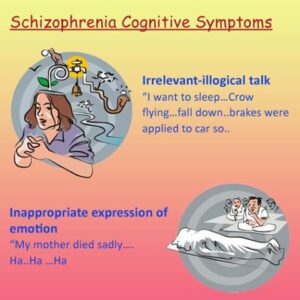
- Difficulty making decisions or solving problems; organizing work or other activities
- Severe memory loss
- Trouble concentrating
- Memory loss
- Difficulty speaking
- Loss of energy
- Very slow movement
- Tiredness or lack of interest in things
It is important to recognize the different types of schizophrenia symptoms. So that you know what kind of problems your loved one may be experiencing. Learning more about schizophrenia helps you become a better caregiver for someone with this illness. If your loved one has schizophrenia, staying informed will help you find ways to provide assistance and improve communication with your loved one.
Most people with schizophrenia experience a combination of positive, negative, and cognitive symptoms. So these symptoms can vary greatly from person to person. Therefore, some people may only have a few mild symptoms, while others may have many severe symptoms.
How To Cope With Symptoms Of Schizophrenia
One of the most difficult aspects of dealing with a schizophrenic person is not knowing what to expect from them. One minute they can be normal and the next minute, they seem completely different. When someone you care about has schizophrenia, it’s important that you learn what to do when they experience sensory or psychotic disturbances.
Here are some tips to cope with schizophrenic symptoms-
1. Be patient and understanding
One of the main problems with schizophrenia is that it makes it difficult for people to think clearly and communicate effectively. This can lead to a lot of frustration for both you and your loved one, so try to be patient and understanding.
2. Learn about the disorder
The more you know about schizophrenia, the easier it will be to understand what your loved one is going through. You can find lots of information online or from a mental health professional.
3. Stay calm during episodes
When your loved one experiences a schizophrenic episode, it’s important to stay calm. Getting angry or frustrated will only make things worse.
4. Be supportive
During an episode, your loved one may feel confused, frightened, and like they aren’t in control of themselves. They need your support to get through this difficult time.
5. Speak slowly and calmly
 When you’re talking to someone with schizophrenia, it’s best to speak clearly and slowly without any sudden movements or loud noises. Loud sounds or quickly changing subject matter can trigger frightening thoughts and images for your loved one, causing them to have a schizophrenic reaction such as paranoia or having hallucinations (false sensory experiences).
When you’re talking to someone with schizophrenia, it’s best to speak clearly and slowly without any sudden movements or loud noises. Loud sounds or quickly changing subject matter can trigger frightening thoughts and images for your loved one, causing them to have a schizophrenic reaction such as paranoia or having hallucinations (false sensory experiences).
6. Be aware of side effects from medication
Antipsychotic medications can cause unpleasant side effects such as dry mouth, nausea, constipation, muscle stiffness or spasms, drowsiness, and weight gain. If your loved one is experiencing these side effects, be sure to talk to their doctor about ways to help make them more comfortable.
7. Seek professional help
If you’re having a lot of trouble dealing with your loved one’s schizophrenia symptoms. Then it may be helpful to seek professional help. A mental health professional can provide you with support and guidance on how to best deal with the disorder. But there is no one-size-fits-all schizophrenia treatment. The best schizophrenia treatment plan is the one that helps the person manage their symptoms successfully. No single schizophrenia medication works for everyone. So it’s important to work with your doctor to find which medications are most likely to help you.
8. Take care of yourself
 It’s important to take care of yourself as well when you’re caring for someone with schizophrenia. Make sure to get plenty of rest and exercise, and find time for yourself to relax and de-stress. Caring for someone with schizophrenia can be challenging, but by using these tips you can better cope with the symptoms they experience.
It’s important to take care of yourself as well when you’re caring for someone with schizophrenia. Make sure to get plenty of rest and exercise, and find time for yourself to relax and de-stress. Caring for someone with schizophrenia can be challenging, but by using these tips you can better cope with the symptoms they experience.
If you or someone you know is struggling with schizophrenia, please seek professional help. There are many resources available to help you get the support you need.
The main problems with schizophrenia are that it makes it difficult for people to think clearly and communicate effectively. This can lead to a lot of frustration for both you and your loved one, so try to be patient and understanding. Because the more you know about schizophrenia, the easier it will be to understand what your loved one is going through. You can also find lots of information online or from a mental health professional. When your loved one experiences a schizophrenic episode, it’s important to stay calm. Getting or frustrated will only make things worse.
Conclusion
Schizophrenia symptoms can vary in severity. Some people with schizophrenia may only hear voices, see things that others cannot, or believe that they are being followed. Whereas, others experience delusions like believing their thoughts aren’t really their own and thinking somebody is controlling them by the radio waves of a nearby building (called “thought broadcasting”). But the good news is there’s help for those who suffer from this mental disorder. Treatment includes medications to control psychotic symptoms, therapy to unpack feelings about oneself and one’s experiences as well as education on how to better manage emotions. So, if you are looking for the treatment of schizophrenia, reach out to our team today. And get the best suitable treatment.
If you are looking for affordable Online Counseling MantraCare can help: Book a trial therapy session


